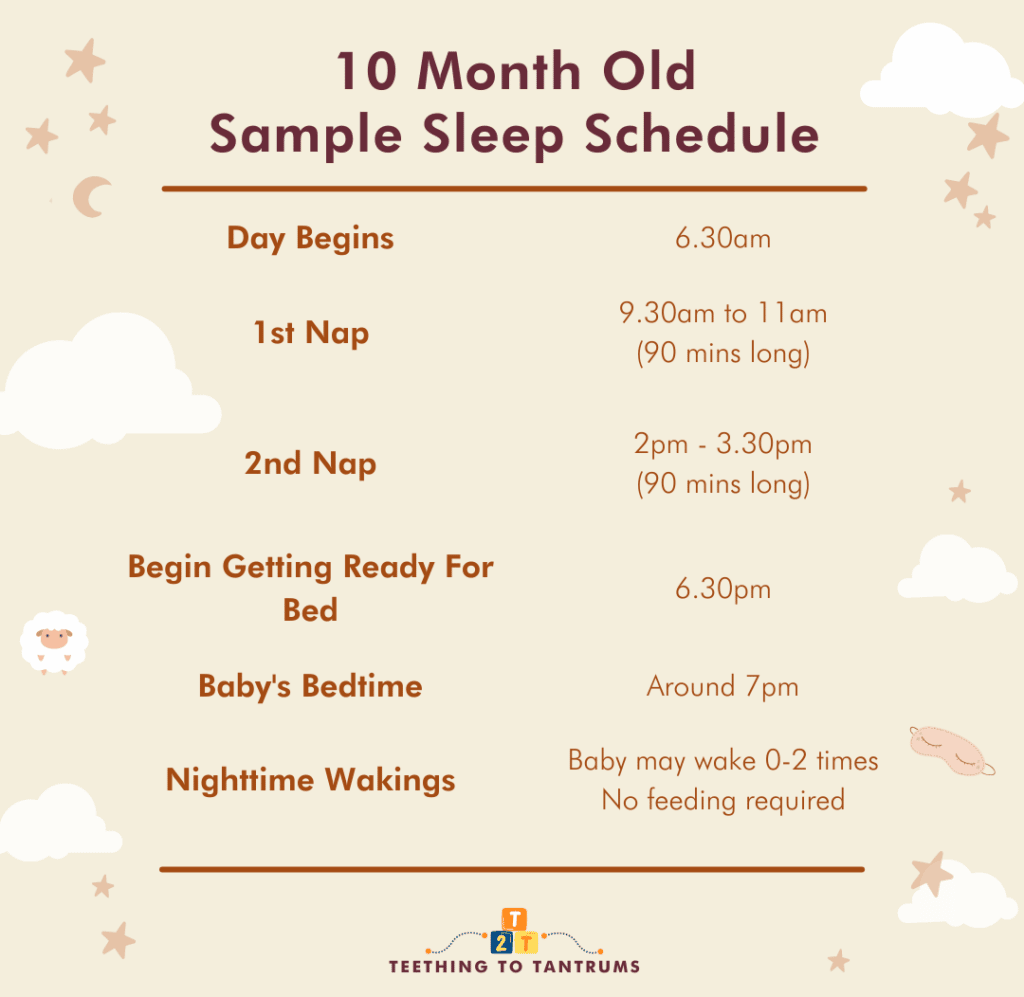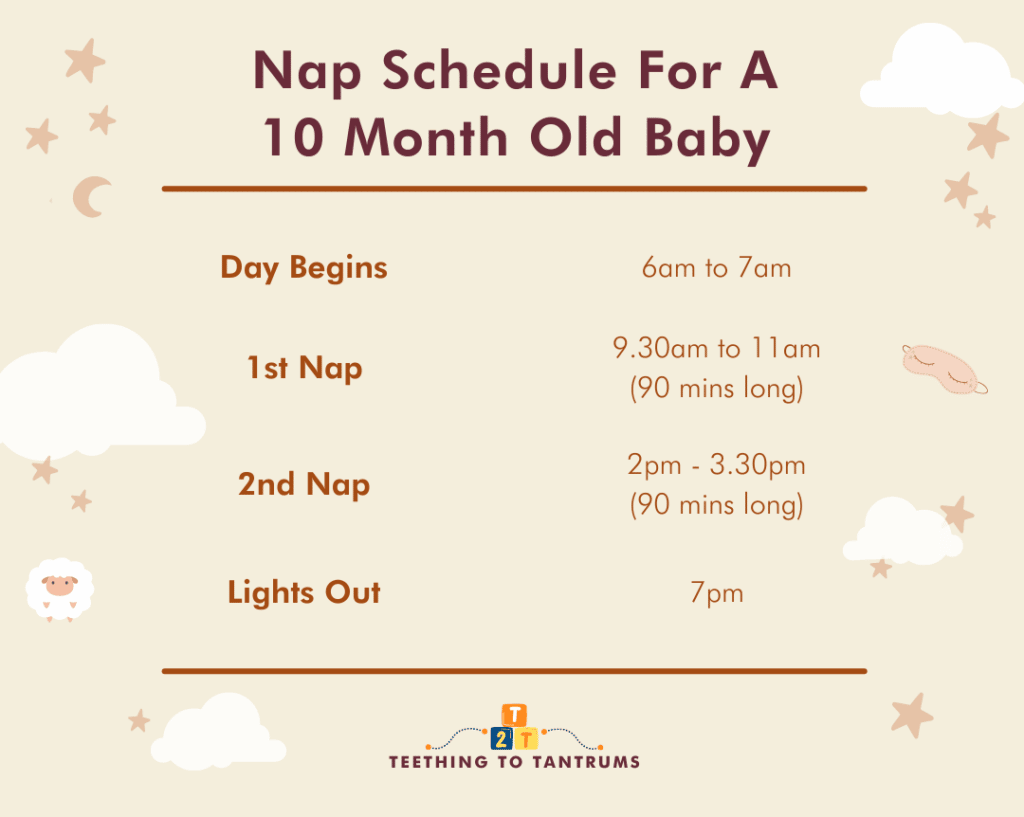Healthy sleep patterns start with a schedule. Here’s how to get your baby onto a regular 10 month old sleep schedule with top tricks to make maintaining healthy sleep habits as easy as possible.
How Much Should A 10 Month Old Sleep
Your 10 month old will need between 12-16 hours of sleep in a 24 hour period. They will take 11-12 hours at night and the remaining 2-4 hours will be taken across 2 daytime naps.
10 Month Old Wake Window
At 10 months, your baby will have around 3-4 hours of awake time between sleep periods.
This ensures that your baby has enough awake time during the day to meet their developmental milestones and to consume enough daytime calories to grow at a rapid rate.
Make the most of these awake times to offer your little one lots of stimulating play and opportunities to learn new skills.
TOP TIP: If your baby had a quick nap and is showing signs of being tired during their wake window (having only been awake for a short period of time…) then let them go to sleep again and DO NOT wait for ‘nap time‘. Trying to keep your baby awake will only lead to them getting overtired and being unable to settle.
Sample 10 Month Old Sleep Schedule
By 10 months old, your baby will be sleeping through the night and they will be having 2 roughly equal-length naps a day.
Here’s a sample 10 month old sleep schedule to give you a guideline for how your baby’s day might flow:

REMEMBER: This 10 month old sleep schedule is a guideline and will differ from baby to baby. As you become more in tune with your baby’s needs and learn what works for them, you will find a sleep schedule that meets your needs.
Nap Schedule For 10 Month Old Baby
Here’s a quick reference for a 10 month old nap schedule to help you visualise your baby’s daytime sleep habits:

How Many Naps Should A 10 Month Old Baby Take?
A 10 month old will now have 2 naps per day. However, you may find they need an extra cat nap if their day has been incredibly busy.
TOP TIP: Aim to put baby down for their morning nap around 3 hours after waking up and their second nap about 3 hours after the first has finished.
Bedtime For 10 Month Old
For a 10 month old sleep schedule, your baby’s bedtime routine should now be firmly in place and it will not change much from now on.
A simple bedtime routine will consist of:
- Having a bath,
- Getting dressed in suitable nightwear,
- Cosying up together with a suitable baby book and singing a lullaby,
- Having a feed or drink
- And finally, settling baby down to sleep in their crib.
The entire bedtime routine should start between 6pm and 6.30pm and take no longer than 30 minutes.
When looking for a crib I really feel that one that can grow with your baby is best. This lovely crib easily adapts to a toddler bed, then day bed or full size making the transition from crib to bed easier and less stressful for your little one. Couple this with its Greenguild Gold certification and stylish design this is a real value for money crib.
REMEMBER: The bedtime routine should follow the same steps and be repeated at the same time every evening to ensure your 10 month old can recognise the signs that bedtime is coming to help them settle and fall asleep more easily.
Looking to get your little one to sleep quickly and effortlessly? Check out my Bedtime and Nap Cheat Sheet and master the art of making daytime naps and bedtimes as seamless as possible.
A bedtime & nap cheat sheet so good your little one will ask you to put them to bed...
Laura Williams "This is a life saver! I'm so glad I downloaded your bedtime & nap cheat sheet. My little one actually asked me to put him to bed last night! Unbelievable! Thank you so much!"
Click Here For The FREE Cheat Sheet
Is There A Sleep Regression At 10 Months?
Sleep regressions can occur at any age but there are certain times when they are more likely to happen.
Mainly at 4 months, 6 months, between 8 and 10 months and around 12 months old.
If you suspect your 10 month old is going through a sleep regression, they may experience sleep issues such as:
- fighting bedtime,
- waking from naps early,
- experiencing sleep disturbances due to an active mind and energetic body from learning new skills
- or increased night wakings.
Read these posts to help you navigate the situation:
- Surviving The 8 Month Sleep Regression
- Surviving The 10 Month Sleep Regression
- Surviving The 12 Month Sleep Regression
- Sleep Regression: What, Why, Signs and Solutions
10 Month Old Sleep Tips
Establishing and maintaining a 10 month old sleep schedule will make your day much easier to manage because after all… Everything starts and ends with sleep!
Here are some of my top sleep tips to make creating and maintaining a 10 month old sleep schedule as simple as possible:
- Have a regular bedtime routine. I cannot emphasise how important it is to have a consistent bedtime routine. Start the routine at the same time every day and aim to have your baby in bed at the same time each evening.
- Lower the energy at the end of the day. By 10 months old, your baby is more aware of what is going on around them and can be more easily distracted… So prepare your baby for sleep by not letting things get too exciting before bedtime. Keep your interactions calm and low-key.
- Check the sleep environment. Have a room thermometer to check that the room is at the correct temperature and ensure your baby is wearing the correct sleep sack for the weather. Install a night light so you don’t have to turn on bright lights to deal with nighttime wakings either.
Finding the right night light for your child can be quite a task. You want something safe, comforting, and practical. The Cozy Starry Night Light ticks these boxes, with eye-friendly warm lighting and an easy-to-use dimmer.
Its gentle glow makes it the best night light for feeding baby, diaper changes, or comforting your little one back to sleep.
As your baby grows the Cozy Starry Night Light's starry sky projection can provide comfort and gentle quiet time stimulation. Its soft lighting ensures a dreamy, peaceful environment, supporting your baby’s natural sleep cycle.
It really is a fantastic nightlight (at a very reasonable price!)
- Eye-friendly warm lighting with adjustable brightness.
- Includes a timer function for convenience.
- Projects a starry sky that is soothing for little ones.
- Rechargeable battery, so it's very portable.
- A USB adapter is not included for charging.
- The star projector is static without motion (however, this is ideal for very young babies and toddlers).
- Battery life varies based on the brightness settings.
- Get some fresh air every day. Fresh and natural light will help to regulate your baby’s melatonin levels, circadian rhythm and internal clock. Taking your baby outside every day for a walk in their pram or simply sitting in the garden to play on a blanket will definitely help establish a healthy 10 month old sleep schedule.
- Avoid your baby getting overtired. As your baby becomes more active and stays awake for longer periods of time it is very easy for them to become overtired, resulting in them fighting sleep. So, watch for sleep cues and ensure your little one has timely daytime naps and a regular bedtime as a part of their 10 month old sleep schedule.
- Be consistent in how you treat nighttime waking. As your 10 month old baby is now on a well-established solid foods diet with 3 meals a day, they do not require feeding at night. Therefore, if your baby wakes at night, wait a while to see if they will resettle and if necessary go to them and comfort them without picking them up or talking. Using a white noise machine can help a lot in these situations.
White noise machines are a game-changer for your little one's sleep and having one that plays all night is a must. With a long-lasting battery, this compact and stylish white noise machine contains 21 non-stop relaxing noises, which will lull your little one to sleep night after night, no matter where you are!
- Make sure baby is getting enough solids. There is a sharp increase in physical activity at 10 months of age and your baby’s appetite will increase too. Make sure they are getting enough to eat to ensure that hunger is not the cause of any sleep disruptions.
- Make naps a priority. Try and make sure that your baby takes most of their naps at home. The occasional nap on the go is inevitable and OK, but try not to do this on a daily basis.
TOP TIP: Don’t be tempted to cut down on daytime naps to improve nighttime sleep… An overtired baby will not settle easily or stay asleep for long as they are full of adrenaline and cortisol.
Common 10 Month Old Sleep Problems
The most common sleep disturbances that your baby may encounter when establishing and maintaining a consistent sleep schedule are:
- Experiencing a sleep regression.
- Early morning waking because they are more aware of the light and sounds that surround them or because they went to bed early.
- Restless settling because they are feeling discomfort from teething.
- Fighting sleep because they’re overtired.
- Crying when away from you due to separation anxiety.
- Resisting bedtime because they have not calmed down for the day.
- Night-time waking and crying because they need your touch to self-settle back to sleep.
- Inability to self-soothe. Check out the video below if you need to teach baby to self-settle.
Frequently Asked Questions About A 10 Month Old Sleep Schedule
Looking for more help with creating your baby’s 10 month sleep schedule? Find answers to the most common questions here.
What Time Should A 10 Month Old Go To Bed?
For a 10 month old sleep schedule, your baby should be in bed with the lights out by 7pm.
If you want to adjust your schedule to have a later or earlier bedtime, you must change your daily nap times accordingly.
REMEMBER: No matter what… your baby should not be in bed any later than 8pm to ensure your baby gets enough sleep to support their brain’s growth and development as well as their physical development. And to avoid sleepless nights!
Is 10 Months Too Early For One Nap?
Yes. 10 months old is too early for one nap.
If you drop to one nap, your baby will become overtired and may be more prone to sleep issues.
Babies are usually 12 months old before they are ready for a 1 nap schedule.
How Much Nighttime Sleep Is Appropriate For A 10 Month Old?
As always timings will vary from baby to baby but most 10 month old babies will sleep between 10 and 12 hours at night.
Why Is My 10 Month Old Fighting Naps?
Your 10 month old may be fighting naps because they:
- Are experiencing a sleep regression.
- They are going through a big developmental leap.
- Their sleep routine has changed (Are you on holiday? Visiting friends? Or have you changed the bedtime routine?)
- The sleep environment is not cosy enough for your baby to fall asleep in.
Which Nap Do Babies Drop First?
When your little one is ready to drop a nap, it will be the morning nap that will be dropped first around baby’s 1st birthday.
However, this is a big transition and will vary from baby to baby and for quite some time you may find your baby needing 2 naps on some days and 1 nap on another.
Can You Sleep Train A 10 Month Baby?
Yes, you can sleep train a 10 month old baby. I prefer the “Gradual Retreat” and “I’ll Be Back” sleep training methods.
Having a healthy and regular sleep routine will set your baby on the right path to good sleep habits and a consistent sleep cycle for years to come.
When Do I Need To Talk To A Doctor About My 10 Month Old’s Sleep Patterns?
If your baby is experiencing a change in sleep patterns alongside the following, then you should seek out medical advice from a doctor, sleep expert or sleep consultant to rule out anything more sinister:
- Your baby is eating less.
- Your baby is not gaining weight.
- Your baby is having fewer than 4 wet diapers and 3 bowel movements a day.
- They are regularly sleeping for less than 6 hours at night.
- They are not falling into a consistent sleep pattern at all.
Sleep Schedules Further Reading
Here are some more sleep schedules to help you get the most out of helping your little one sleep as best they can.
After all…
Sleep breeds sleep!
- Newborn Sleep Schedule
- 1 Month Old Sleep Schedule
- 2 Month Old Sleep Schedule
- 3 Month Old Sleep Schedule
- 4 Month Old Sleep Schedule
- 5 Month Old Sleep Schedule
- 6 Month Old Sleep Schedule
- 7 Month Old Sleep Schedule
- 8 Month Old Sleep Schedule
- 9 Month Old Sleep Schedule
- 10 Month Old Sleep Schedule
- 11 Month Old Sleep Schedule
- 12 Month Old Sleep Schedule
- 13 Month Old Sleep Schedule
- 14 Month Old Sleep Schedule
- 15 Month Old Sleep Schedule
- 16 Month Old Sleep Schedule
- 17 Month Old Sleep Schedule
- 18 Month Old Sleep Schedule
- 19 Month Old Sleep Schedule
- 20 Month Old Sleep Schedule
- 21 Month Old Sleep Schedule
- 22 Month Old Sleep Schedule
- 23 Month Old Sleep Schedule
- 2 Year Old Sleep Schedule
- 30 Month Old Sleep Schedule
- 3 Year Old Sleep Schedule
Need More Parenting Help?
- Download our FREE Bedtime & Nap Sleep Cheat Sheet. It’s a free, easy-to-use and proven formula designed for parents of 0-5 year olds to master the art of consistently undisturbed and restful sleep without the yelling, nagging or exhausting long-winded evenings.
- Check out our Parenting Toolbox. You’ll get access to expertly-chosen products that you can guarantee are the best for your little one and your wallet.
- Are you looking for personalized guidance to navigate the challenges of parenting? I offer 1-on-1 consultations to bring you tailored strategies and actionable advice to help support your child's growth and well-being with confidence.

A bedtime & nap cheat sheet so good your little one will ask you to put them to bed...
Laura Williams "This is a life saver! I'm so glad I downloaded your bedtime & nap cheat sheet. My little one actually asked me to put him to bed last night! Unbelievable! Thank you so much!"
Click Here For The FREE Cheat Sheet





